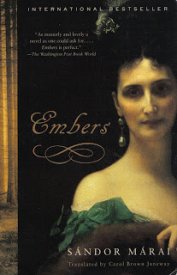Stewart
Active Member
July 2008 Book of the Month
Embers by Sándor Márai

Discussion on this book begins July 1st.
Embers by Sándor Márai

Amazon.com Review
In Sándor Márai's Embers, two old men, once the best of friends, meet after a 41-year break in their relationship. They dine together, taking the same places at the table that they had assumed on the last meal they shared, then sit beside each other in front of a dying fire, one of them nearly silent, the other one, his host, slowly and deliberately tracing the course of their dead friendship. This sensitive, long-considered elaboration of one man's lifelong grievance is as gripping as any adventure story and explains why Márai's forgotten 1942 masterpiece is being compared with the work of Thomas Mann. In some ways, Márai's work is more modern than Mann's. His brevity, simplicity, and succinct, unadorned lyricism may call to mind Latin American novelists like Gabriel García Márquez, or even Italo Calvino. It is the tone of magical realism, although Márai's work is only magical in the sense that he completely engages his reader, spinning a web of words as his wounded central character describes his betrayal and abandonment at the hands of his closest friend. Even the setting, an old castle, evokes dark fairy tales.
In Sándor Márai's Embers, two old men, once the best of friends, meet after a 41-year break in their relationship. They dine together, taking the same places at the table that they had assumed on the last meal they shared, then sit beside each other in front of a dying fire, one of them nearly silent, the other one, his host, slowly and deliberately tracing the course of their dead friendship. This sensitive, long-considered elaboration of one man's lifelong grievance is as gripping as any adventure story and explains why Márai's forgotten 1942 masterpiece is being compared with the work of Thomas Mann. In some ways, Márai's work is more modern than Mann's. His brevity, simplicity, and succinct, unadorned lyricism may call to mind Latin American novelists like Gabriel García Márquez, or even Italo Calvino. It is the tone of magical realism, although Márai's work is only magical in the sense that he completely engages his reader, spinning a web of words as his wounded central character describes his betrayal and abandonment at the hands of his closest friend. Even the setting, an old castle, evokes dark fairy tales.
Discussion on this book begins July 1st.


